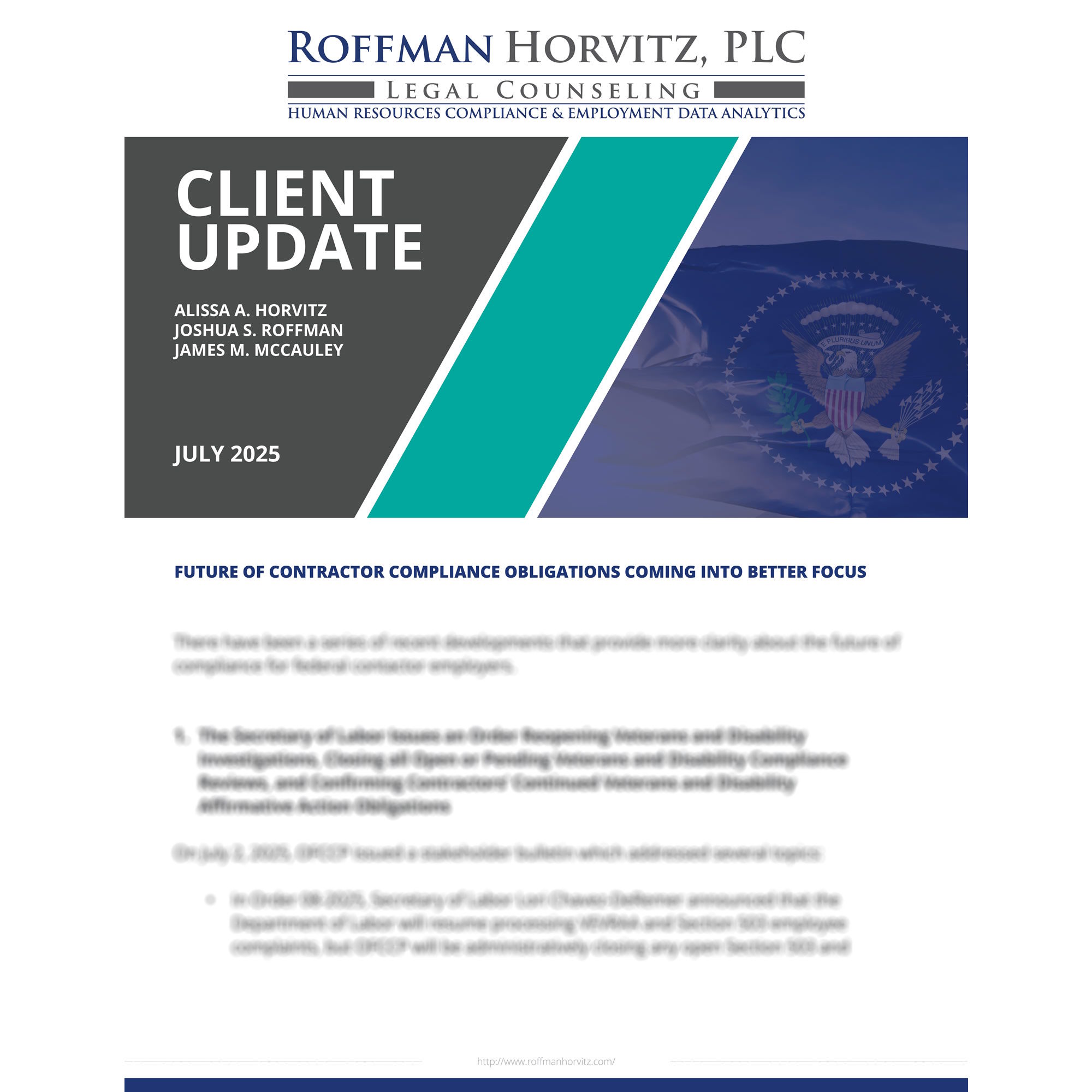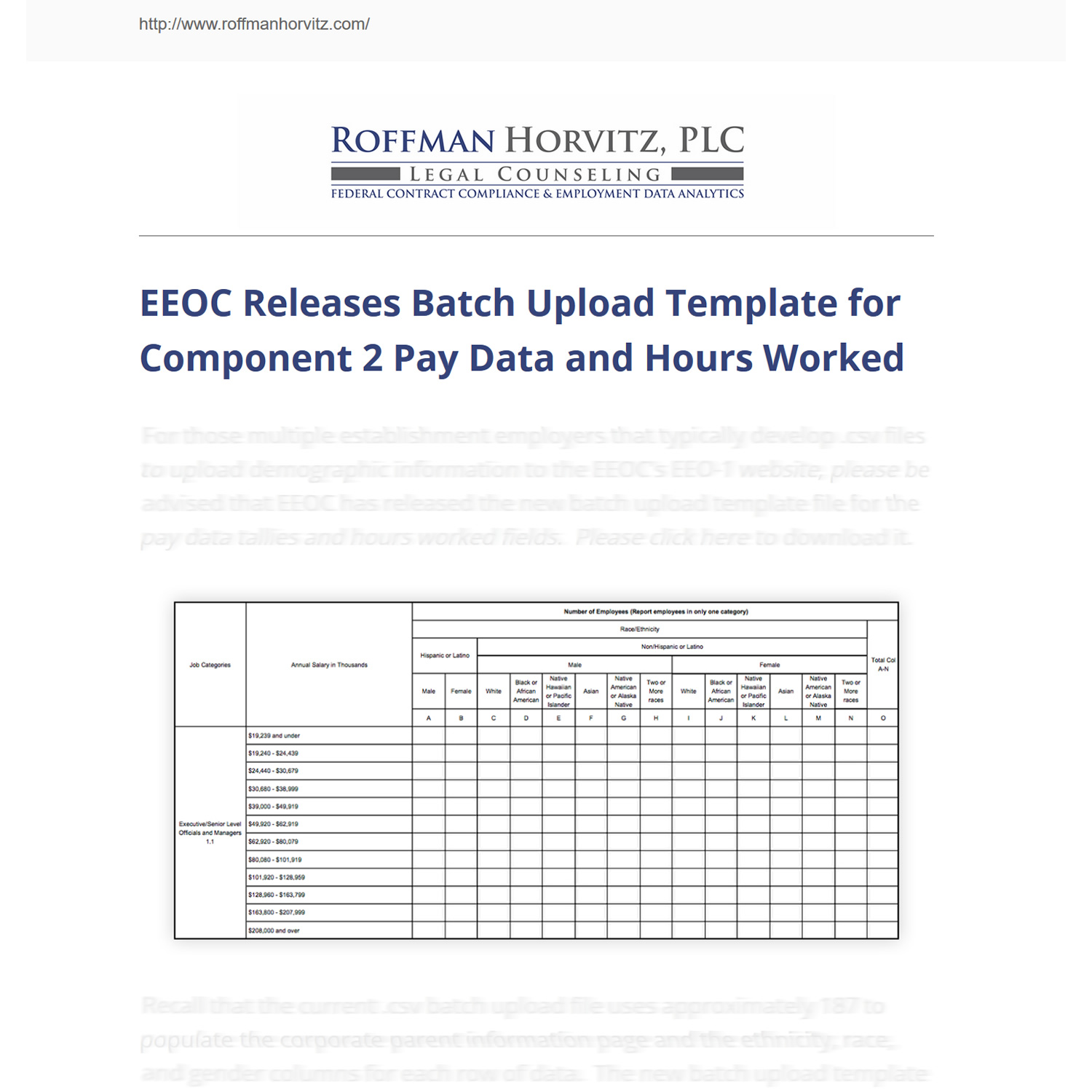Directive (DIR) 2020-03
U.S. DEPARTMENT OF LABOR
Office of Federal Contract Compliance Programs
A Directive (DIR) is intended to provide guidance to OFCCP staff and/or federal contractors on enforcement and compliance policy or procedures. A DIR does not change the laws and/or regulations governing OFCCP's programs and does not establish any legally enforceable rights or obligations. The contents of this document do not have the force and effect of law and are not meant to bind the public in any way. This document is intended only to provide clarity to the public regarding existing requirements under the law or agency policies.
Effective Date: April 17, 2020
- SUBJECT: Pre-Referral Mediation Program
- PURPOSE: To establish a mediation program offered by the Office of Federal Contract Compliance Programs (OFCCP) to federal contractors and subcontractors to resolve findings of discrimination violations prior to referrals to the Office of the Solicitor for enforcement.
- REFERENCES: This Directive (DIR) references the guidance listed below.
- Executive Order (EO) 11246, as amended.
- Section 503 of the Rehabilitation Act of 1973, as amended (Section 503).
- Vietnam Era Veterans' Readjustment Assistance Act of 1974, as amended (VEVRAA).
- 41 CFR Chapter 60, Office of Federal Contract Compliance Programs, Equal Employment Opportunity, Department of Labor.
- Federal Contract Compliance Manual (FCCM) (Dec. 2019).
- DIR 2019-02, Early Resolution Procedures (Nov. 30, 2018).
- AFFECTED POLICY: None
- BACKGROUND:
Consistent with its duty to conciliate,[1] OFCCP confers with federal contractors and subcontractors (contractors) through a variety of mediums regarding alleged violations. This process can consume a considerable amount of time and resources for both the agency and stakeholders. On November 30, 2018, OFCCP issued Directive (DIR) 2019-02, Early Resolution Procedures to promote early and efficient settlement of supply-and-service compliance evaluations prior to the issuance of a Predetermination Notice (PDN) through the closure of cases with non-material violations and the conclusion of conciliation agreements in cases with material violations. OFCCP also seeks to ensure there are opportunities to resolve matters later in its review process, but prior to referring cases to the Office of the Solicitor (SOL) for enforcement. In order to provide the best opportunity for resolving matters before significant time and resources are spent in the enforcement process, OFCCP now formalizes the mediation procedures detailed herein.
Mediation is the process of resolving disputes utilizing the services of a neutral third party (mediator) who is tasked with facilitating the negotiation between OFCCP and a contractor (the parties). The presence of a mediator allows the parties an opportunity to:
- Gain clarity on each other's positions;
- Identify all relevant issues and interests;
- Receive an impartial perspective about the possibilities for resolution;
- Strategize around concession-making and settlement offers;
- Consider alternative methods to achieving resolution; and
- Design a plan for next steps if settlement is not possible.
The mediator will not make a ruling or execute a final decision, but will assist the parties in weighing their options and finding mutually satisfactory outcomes.
OFCCP has utilized third-party mediators in the past to assist in the resolution of large and aged cases. Pursuant to this Directive, OFCCP will offer contractors an opportunity to mediate as a last attempt at obtaining timely remedies and avoiding the delay and expense of litigation. Mediation is not intended as a substitute for the conciliation period between a Notice of Violation (NOV) and Show Cause Notice (SCN). OFCCP reserves the authority to mediate at any stage, but OFCCP believes mediation is most useful after attempts to conciliate following the issuance of a SCN citing violations of discrimination, but prior to referral for enforcement, were unsuccessful.
The parties may select the mediator from certain sources: (1) mediators from the Federal Mediation and Conciliation Service (FMCS) roster or from other qualified federally approved mediators; (2) the OFCCP Ombudsman; and (3) any qualified individual proposed by the contractor. If the parties cannot agree on the parameters of a pre-referral mediation, OFCCP retains the discretion to refer a case without first attempting mediation.
OFCCP also retains the discretion to bypass mediation in two types of cases. First, OFCCP might not attempt pre-referral mediation following the issuance of an access SCN due to the expedited and interlocutory nature of access cases. Second, OFCCP might not offer mediation in the very rare case where it proceeds directly to an enforcement recommendation without issuing a SCN based on exceptional circumstances.
- ROLES AND RESPONSIBILITIES:
- National Office is responsible for:
- The OFCCP Director, Director of Enforcement, and Ombudsman will coordinate with the Director of FMCS and his or her staff to ensure consistent availability of FMCS mediators, as necessary.
- The OFCCP Ombudsman will be available to mediate in appropriate cases, pending mutual agreement of both parties.
- The Director of Enforcement will consider contractor proposals for recommended mediators.
- The Director of Enforcement, in consultation with Regional Directors and the Regional Offices of the Solicitor, will prepare mediation submissions to be distributed to the mediator in advance of mediation sessions as necessary.
- The OFCCP Director will be kept fully advised of cases in the program by the Director of Enforcement and Regional Directors, and will ensure that an official with final settlement authority for the agency is present at all mediation sessions.
- Regional Directors are responsible for:
- In consultation with the Director of Enforcement and the Regional Office of the Solicitors, Regional Directors will, as necessary, prepare mediation submissions to be distributed to the mediator in advance of mediation sessions, in addition to any presentation materials to be utilized at mediation sessions.
- Participate in all pre-mediation conversations with the mediator and contractor.
- Attend mediation sessions as the lead presenter along with other officials such as the Director of Enforcement, as designated by the OFCCP Director.
- Regional Office of the Solicitor is responsible for:
- In consultation with the Director of Enforcement and the Regional Directors, the Regional Office of the Solicitor will, as appropriate, assist in the preparation and/or review of mediation submissions to be distributed to the mediator in advance of mediation sessions.
- Participate in pre-mediation conversations with the mediator and contractor, as appropriate.
- Attend mediation sessions as legal counsel for OFCCP, as appropriate.
- National Office is responsible for:
- POLICY AND PROCEDURES: Under this Pre-Referral Mediation Program, OFCCP will offer mediation in cases where it has issued a SCN for a discrimination violation, but prior to referral to SOL for enforcement. If mediation is unsuccessful, OFCCP will generally refer the case to SOL for enforcement. OFCCP might not attempt pre-referral mediation following the issuance of an access SCN or in the very rare case where it proceeds directly to an enforcement recommendation without issuing a SCN because of exceptional circumstances.
While each mediation is unique and the chosen mediator may wish to institute their own process for conducting the mediation based on the specific issues, OFCCP provides the following as suggested steps and procedures that would apply to most mediations:
- OFCCP and the contractor will each propose three potential mediators to the other party. OFCCP will only choose from the FMCS roster of mediators and the OFCCP Ombudsman, or from other qualified federally approved mediators.
- OFCCP and the contractor will rank each of the mediators nominated, and the candidate that receives the highest combined ranking will be selected. If there is a tie, OFCCP and the contractor will attempt to reach a mutual decision on a mediator. If the parties cannot reach a mutual decision, OFCCP will ask the FMCS Director or his or her designee to select a mediator from the FMCS roster. The FMCS Director or designee may consider the mediator's location and substantive expertise, as well as any other considerations the FMCS Director or designee deem relevant, except that the FMCS Director or designee may not select a mediator who was on either of the parties' list of nominees.
- Once a mediator is chosen, pre-referral mediation will be convened and attempted as soon as practicable, and ideally within 30 days of the selection of the mediator.
- Prior to the start of mediation, the parties and the mediator should work together to develop mutually agreeable parameters for the structure of the mediation, including whether parts of the mediation will include joint and/or private sessions.
- Each party should be given the opportunity to produce a mediation submission to be shared with the mediator and, as appropriate, with the other party by a mutually agreeable date. Submissions should be exchanged with enough time in advance of the mediation session to allow the mediator and, if applicable, both parties to read and digest respective views. The parties will treat these submissions as confidential.
- If either party wishes to share information with the mediator only, they should designate mediation submissions “for the mediator's eyes only,” which also shall be treated as confidential.
- At the time set by the mediator, both sides should be available for private, confidential pre-mediation phone sessions with the mediator to answer questions and set expectations.
- The parties should agree on a reasonable but expeditious timeframe in which to conclude the mediation, which in most cases should not exceed two business days.
- Mediation will be held at a mutually agreed upon and neutral location. Whenever possible, the parties should utilize the mediator's office space or, if not available, suitable alternative arrangements that are conducive to maximizing the engagement levels of all participants.
- At the outset of a mediation session, a confidentiality agreement will be signed by all mediation attendees.[2]
- The parties must remain open to the procedural decisions employed by different mediators, but should generally prepare for mediation with the expectation that a structure featuring both joint and private sessions is customary.
- Key decision makers should attend in person for, at a minimum, the introductory statements, and be available by phone thereafter if their guidance and expertise is necessary for the duration of the mediation. If unavailable, secondary decision-making authority should be granted and clearly articulated to the mediator and other party.
- The parties should ensure that they reserve the entire period that has been agreed upon for the mediation session to maximize the potential for settlement.
- In addition to offering mediation after the issuance of a SCN, OFCCP reserves the ability to suggest mediation at other stages of a compliance evaluation, as it deems appropriate.
- OFCCP will seek to develop a mediator list based on neutral criteria comprised of FCMS and other federally approved mediators who have experience mediating alleged pattern and practice employment discrimination cases.
- INTERPRETATION: This Directive does not create new legal rights or requirements or change current legal rights or requirements for contractors. Executive Order 11246, Section 503, VEVRAA, OFCCP's regulations at 41 CFR Chapter 60, and applicable case law are the official sources for contractors' compliance responsibilities. Nothing in this Directive is intended to change otherwise applicable laws, regulations, or other guidance or to restrict or limit OFCCP's ability to perform compliance reviews, request data, or pursue enforcement of any issue within its jurisdiction. This Directive is not intended to have any effect on pending litigation, nor would this Directive have altered the agency's basis for litigating any pending cases.
- ATTACHMENTS: None
SIGNATURE:
________________________________
/S/
CRAIG E. LEEN
Director
Office of Federal Contract Compliance Programs
[1]See 41 CFR §§ 60-1.20(b), 60-300.60(b), 60-741.60(b).
[2] Both parties will retain the right to refer to the mediation session as evidence of their good faith conciliation efforts.
Last updated on April 17, 2020
Download a PDF version (from the OFCCP site)

